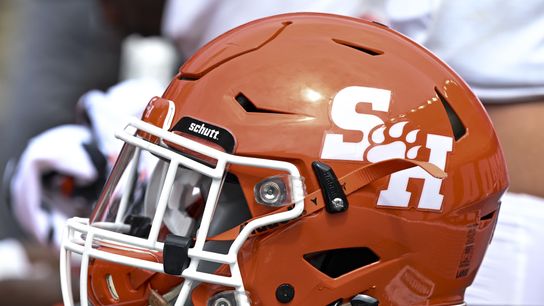If the NCAA Division I Council has its way, the minimum cost to transition from FCS to FBS will soon be $11 million.
After meeting this week in Indianapolis, the Council announced it is proposing changes that will make it more expensive -- prohibitively so, in some cases -- to move up.
For starters, the Council would drop the attendance requirement (FBS teams are required to average at least 15,000 over a rolling 2-year period) in favor of standard that would establish a minimum number of scholarships offered to compete in football's highest division. From the announcement:
If adopted, all FBS schools would be required to provide 90% of the total number of allowable scholarships over a two-year rolling period across at least 16 sports, including football. Schools also would be required to offer at least 210 scholarships each year, amounting to no less than $6 million in athletics scholarships offered.
Also, the transition fee to move from FCS to FBS would increase by a factor of one thousand, from $5,000 to $5 million.
"These requirements will directly benefit college athletes competing in Division I sports by requiring significant investment in scholarship opportunities," said Jon Steinbrecher, commissioner of the Mid-American Conference and vice chair of the Division I Council. "Over the past several years, the NCAA's collected data about spending at FBS schools indicate that these requirements are reasonable and attainable for the majority of impacted athletics programs."
The Football Bowl Subdivision grew by a dozen schools from 2012 to 2022, and overall FBS membership will move to 133 schools once Jacksonville State and Sam Houston kick off this fall. Kennesaw State will make it 134 starting in 2024. The majority of those new schools have been successful in college football's highest division (2-time C-USA champion UTSA, 2020 Sun Belt champion and AP Top 15 finisher Coastal Carolina, to name two), but the Council is clearly working th keep that number from swelling to 150.
The proposals will now be forwarded to Division I membership for feedback. A date for a vote has not been scheduled. If approved, the new scholarship standard would become effective Aug. 1, 2027 for existing FBS schools; schools applying to transition to FBS in 2024-25 or thereafter would have to meet the 90%/210/$6 million rule within two years of joining. The $5 million transfer fee would go into effect immediately.
Other notes:
-- The council proposed reducing the notification-of-transfer window from 60 days to 30. The NCAA's data found the vast majority of athletes enter at the beginning of the window, so a 30-day winter and spring window has been deemed unnecessary.
-- The Division I Legislative Committee ratified a format for punishing athletes who wager on sports.
For all wagering-related violations reported on or after May 2, the following guidelines will apply:
- Student-athletes who engage in activities to influence the outcomes of their own games or knowingly provide information to individuals involved in sports betting activities will potentially face permanent loss of collegiate eligibility in all sports. This would also apply to student-athletes who wager on their own games or on other sports at their own schools.
- If a student-athlete wagers on their own sport at another school, education on sports wagering rules and prevention will be required as a condition of reinstatement, and the loss of 50% of one season of eligibility will be considered.
- For all other wagering-related violations (e.g., wagering on professional sports), cumulative dollar value of the wagers will be taken into consideration with the following terms for reinstatement:
- $200 or less: sports wagering rules and prevention education.
- $201-$500: loss of 10% of a season of eligibility, plus rules and prevention education.
- $501-$800: loss of 20% of a season of eligibility, plus rules and prevention education.
- Greater than $800: loss of 30% of a season of eligibility, plus rules and prevention education.
For cumulative wagering activities that greatly exceed $800, NCAA reinstatement staff are directed to consider whether additional loss of eligibility, including permanent ineligibility, are appropriate.
-- For transfers who no longer compete in sports, schools will no longer have their scholarships counted against their limits. While schools will still be required to provide scholarships for those individuals, if the athlete stops competing due to a coaching change or if the transfer never enrolls in school, that player would not count against the 85-man limit.
"The council also introduced a proposal into the legislative cycle that, if approved, will continue to mandate that transfers who stop competing for nonathletics reasons receive scholarship funds until they graduate, transfer or pursue professional athletics opportunities. However, the proposed change would no longer count those individuals as part of a team's scholarship limits if they withdraw from the school, enabling athletics scholarship dollars to be reallocated to a currently participating student-athlete," the release said.
-- All Division I schools will be required to complete a specialized review of their support services for mental and physical health, safety, and athletics performance, to be done once every four years.
-- Division I schools will have to provide career counseling and life skills programming, effective Aug. 1, 2024, and all D1 coaches will be required to complete education and training in these specialized areas, beginning Aug. 1, 2025. "The council also adopted additional requirements for rules compliance efforts. Each member school will be required to complete a compliance review — involving an authority outside the athletics department — at least once every four years and provide written confirmation of that review's completion to the NCAA national office. These reviews must consider, at minimum, compliance efforts that directly tie to compliance needs of college athletes."
As always, stay tuned to The Scoop for the latest.
